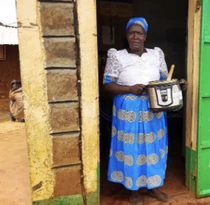|
Last edited: 25 May 2017
|
 Photo credit: Solar Cooking KoZon Togo Tilé established a self-supporting solar cooker business is Mali with a grant from Solar Cooking KoZon in 2014. In 2017 and after extensive analysis of the business, Togo Tilé was selected by a government program intended to stimulate private enterprise in Mali. A business expansion plan was established. Togo Tilé now reports that they have a thriving business with 30 staff members, five points of sale nationwide, and an average monthly business volume of 9,000 €. |
Events
Featured international events
- 4-6 June 2024 (Bridgetown, Barbados): Sustainable Energy for All Global Forum - The event will be co-hosted by Sustainable Energy for All (SEforALL) and the government of Barbados. It is a platform for government, business and finance leaders, entrepreneurs, and youth and community representatives from around the world to come together to broker new partnerships, spur new investment, and address challenges at the nexus of energy, climate, and development. More information...
Online events
- NEW: Thursday, 18 April 2024 (2:30pm-3:15pm EDT), (Washington, D.C., USA): ESMAP Spring Meetings Knowledge Café: Clean Cooking at the Heart of Energy Access - Join ESMAP for this exciting knowledge-sharing opportunity, which will showcase the role of clean cooking as a key part of energy access and energy transition. Presentations by René van Hell, Director of Inclusive Growth, Ministry of Foreign Affair, Netherlands, Dr. Kandeh Yumkella Chairman, Presidential Initiative on Climate, Renewable Energy and Food Security, Sierra Leone, and Chandrasekar Govindarajalu, Practice Manager, ESMAP, World Bank. In-person attendance at World Bank Atrium, MC Front Lobby is for Spring Meetings registrants only. However, you can watch the event online
Requests for proposal
- Decentralized Renewable Energy Solutions utilizing Solar and Bio-Energy - Sustainable Energy Technologies and Assessments of ScienceDirect, is requesting guest-author submissions. The special issue, VSI: DRES is devoted to publishing research articles reporting the innovative designs and design interventions in solar thermal and bio-energy for decentralized energy systems (DES). It includes i) new and novel designs of prototype or commercial devices and technologies, their development, modeling and simulations and experimental validation; ii) innovations for processes, techniques, utilization, and applications; iii) novel use of materials for improving efficiency, performance, techno-economic feasibility, and sustainability and iv) research findings addressing the socio-economic, health and safety impacts, and life cycle assessments leading to proposing novel devices for DES. The Deadline for submission is 31 July 2024. More submittal information...
- See also: Global Calendar of Events and past events in Mali
Most significant projects
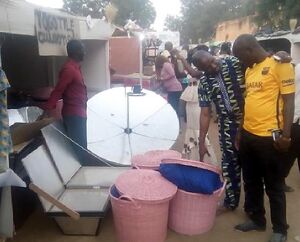
Togo Tilés products for sale at a local market. Photo credit: Solar Cooking KoZon
- Continued success for solar cooking business in Mali - In 2014, Solar Cooking KoZon granted Togo Tilé, a Mali-based solar cooking business run by Seydou Coulibaly, an initial subsidy of €13,300. Two years later, it was an established business with 30 staff members, five points of sale nationwide, and an average monthly business volume of €9,000. Helping the environment, is an important message presented at sales demonstrations and at schools and universities. For Togo Tilé, a contribution to the environment does not end with the sale of the product, as they continue to support and follow-up with their customers.
News
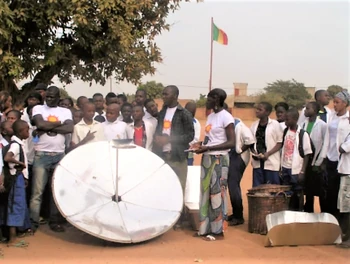
Photo credit: Solar Cooking KoZon
- May 2017: Solar Cooking KoZon (SCK) stimulates ISC private enterprises - In 2014, Solar Cooking KoZon granted Togo Tilé, a Mali-based solar cooking business run by Seydou Coulibaly, an initial subsidy of €13,300. Two years later, it’s a thriving business with 30 staff members, five points of sale nationwide and an average monthly business volume of €4,000. The environment constitutes an important incentive; at sales demonstrations, at schools and universities, close attention is paid to the environmental aspects of solar cooking. For Seydou a contribution to the environment does not end with the sale of the product. Togo Tilé continues to support its customers for some time after the sale, to ensure that the products are truly integrated in daily cooking, to provide a lasting positive contribution to the environment. After extensive analysis of the business, Togo Tilé was selected by a government program intended to focus on stimulating private enterprise in Mali. A business expansion plan was established that included the construction of a bigger workshop and the acquisition of a saw and a welding machine. More information...

Solar box cookers available for sale at Togo Tilé. Photo credit: Solar Cooking KoZon
- September 2016: A sturdy solar box cooker developed by Henk Blok together with students of the Free University and the University of Amsterdam continues to be popular at the Togo Tilé retail store. Henk and Marjan Blok paid the start-up costs for the experiment with these boxes in Mali. Piet Sluimer, a member of the Techniques Work Group, has developed a cheaper cardboard solar box cooker (the smaller box on the right), which is also selling well.
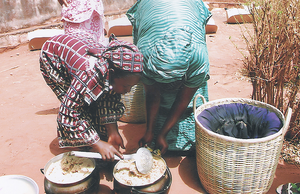
Solar Cooking The Netherlands - KoZon provided solar cookers and hay baskets - Photo credit Solar Cooking KoZon
- September 2016: Mali women with disabilities receive assistance with access to solar cooking - Sixty women from Bamako and Sikasso, Mali, attended a workshop organized by Solar Cooking The Netherlands - KoZon in August. With limited ability to gather wood for fuel, the solar cookers and hay baskets have reduced their wood use by 60 to 70%. Read more...
- December 2015: Solar Cooking The Netherlands - KoZon reports: "We have carefully continued this trend in the latest project together with the Association des Femmes Ingénieurs du Mali (AFIMA) in Tiby, in the Segou area. Eight hundred and fifty Women have been trained. From this group, four cooperatives have been created. They were to continue as businesses that would disseminate solar cooking while being coached by AFIMA. However, our partner has decided that it prefers to continue with other charitable projects. We are therefore going our separate ways. We will have the new Renewable Energy Centre near Mbarara ISC, and information and promotion in Ethiopia for the time being. It is regrettable because AFIMA has been of great value in the dissemination of ISC in Mali. To ensure that the cooperatives will be able to continue, we are attempting to link them to the Togo Tilé project."
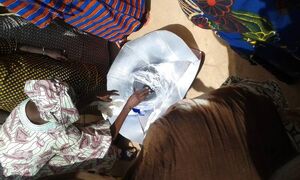
Photo credit: Braced
- December 2015: Forty-five women receive training on Integrated Cooking Method - 45 women from the towns of Koulikoro, Segou and Mopti were provided with CooKits, heat-retention cookers, and training on the Integrated Cooking Method as part of the Community Initiatives Project Building Resilience to Climate for Extreme (RIC4REC), an effort to preserve natural resources in Mali. More information... - (English version).
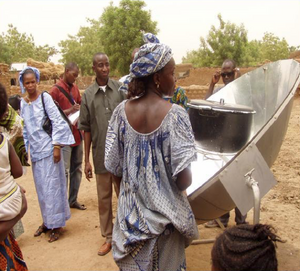
Photo credit: United Nations Development Programme
- June 2015: UNDP trains blacksmiths to build solar cookers - In its recently published Annual Report, the United Nations Development Program highlighted its program in rural Mali which trained local village blacksmiths to build solar cookers, solar dryers, and water heaters. Local residents also had solar panels installed on their homes. Roughly 30,000 people have reportedly benefited from this program. Read more...
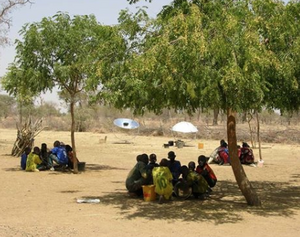
Mid-day meal being prepared at Mali school - Sun and Ice
- January 2015: Only the cooking food is out in the sun at this Mali school - Stephan Zech, with Sun and Ice, posted this photo of a mid-day meal being prepared at a school in Mali.
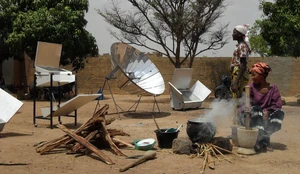
World Vision Mali trains students to use various type of solar cookers.
History
The Sahelian nation of Mali is the site of several solar cooking projects. Desertification is of course an immense problem in this part of Africa. Only 10% of the land has any forest cover, and deforestation continues to occur. As in other areas, clearing land for agriculture and grazing is assumed to be the principal reason for the forests' decline, but there is also recognition that over 70% of wood production is used for cooking. Solar cooking offers one way to stem this unwanted development in Mali.
Researchers at the University of Torino, studying the problem, have experimented with a wide range of fuel-saving devices, dryers, water heaters, solar lighting panels, and solar cookers. (As one researcher said-, "Every day when I get up (and look at the sun), I see all that energy going to waste.) Considerable study done under the auspices of the University, with joint efforts of the Faculty of Agricultural Science and the Interdepartmental Centre of Women's Studies, has included surveys, interviews, and field analyses of both problems and some suggested solutions. Local associations promote various fuel saving devices, such as metal stoves or parabolic cookers; other promote solar cooking (see below for an example). But in a nation without adequate communication channels (television or daily newspapers) and a population with only a 35% literacy rate, spreading new technology is difficult. Radio broadcasting is thought to be the most promising dissemination media. Most important in this situation is the awareness of the problem and the willingness to seek solutions.
One single person, Gnibouwa Diassana, long committed to solar cooking, has managed in these circumstances to make and sell around 50 cookers of the wooden box type. He does this on his own, without assistance even from the NGO for which he works on other kinds of projects. This sole person, working only with a son, has a promotion plan for an energy week and even a business plan that would permit expanded production of solar box cookers. He hopes to find partners among women's organizations but knows that resistance to change, and rigid gender based roles, make it difficult for women to pursue the purchase of cookers. He is however a determined man and perseveres in his work. (Pictures and story, Solar Cooker Review, March 2003).
Another project created by an individual is the work of Lanseri Niare, who has been introducing box cookers, both by teaching people how to build their own cooker and how to use the box when built. Major problems encountered in this project have been glass breakage, termites if the box is used on the ground, and the Harmattan period (a severe windy season) which brings much dust, so that even when sunny, cooking is difficult) (Solar Cooker Review, Dec. 98).
One other project, which has proven successful in Mali, operates under the auspices of the KoZon Foundation, a Dutch organization that works through the western African Sahelian nations. From a beginning in Burkina Faso (see above), the efforts of KoZon and its dedicated volunteer Wietske Jongbloed, have introduced CooKits in Mali since 2001. Wietzke operates at a very grassroots level, taking cookers (mostly using CooKits made in the Sahel to keep cost low) to marketplaces for demonstrations. The CooKits themselves were initially imported from abroad, and then purchased from Burkina Faso. This operation, relatively new, has not yet been evaluated by KoZon, but is gradually moving forward, in cooperation with the Association des Femmes Ingénieurs du Mali.
[Information for this section was taken originally from State of the Art of Solar Cooking by Dr. Barbara Knudson]
- Main article: History of solar cooking
Archived articles
Climate and culture
A 2010 report from Mali’s agriculture ministry said that more than 500,000 hectares of forest are cleared for firewood and charcoal each year in the West African country. But new ways of cooking, using solar power and heat-retention cookers, could cut those losses.[1]
Based on knowledge gained from visiting solar cooking promoters and appropriate technology organizations, J.P. Martin-Vallas has developed some recommendations for solar cooker dissemination in Mali:
- Target cities where firewood is quite expensive, such as in Kayes, Niafunke, and Tombouctou
- Encourage dissemination by women
- Focus on durable box-type solar cookers that accommodate large cooking pots
- Engage local carpenters to make the cookers
- Provide a five-year guarantee for each cooker sold
J.P. Martin-Vallas concluded that imported parabolic-type solar cookers are currently too expensive for most Malians. One way to lower prices, he says, would be to import bulk aluminum sheets and cut panels on site.
The following chart shows some sample annual firewood expenditures for households of 10 people. (Note: In 2005, 500 CFAs was approximately USD $1.)
|
City |
Annual Firewood Expenditure |
|
Kayes |
300,000 |
|
Niafunke |
300,000 |
|
Tombouctou |
280,000 |
|
Douentza |
180,000 |
|
Segou |
150,000 |
|
Waki/Niafunke |
150,000 |
|
Bourem |
120,000 |
|
Koutiala |
100,000 |
|
Koulikoro |
75,000 |
|
Mopti |
75,000 |
|
Kerouane |
60,000 |
Northern part of the country: Desert (Sahel). Southern part of the country: Sunny, little firewood, and populated. (Source: Juan Urrutia Sanz, 2010-Feb-25)
See also
- The climate of Mali - Wikipedia
- Discussion of northern Africa's suitability for solar cooking
- Solar cooker dissemination and cultural variables
Resources
Possible funding
- Find a Kiva microfinance partner in Mali.
- Raising funds through grants and donations
- Soro Yiriwaso, a partner of Save the Children
Project evaluations
- August 2006: Digitally Assisted Diffusion of Innovations - Carole St. Laurent (A case is made to encourage the use of instructional videos made in local languages, over printed materials when introducing solar cooking.)
Reports
- February 2009: Rapport d’activité sur la cuisine solaire au Mali-2008-2009
- February 2008: Rapport d’activité sur la cuisine solaire au Mali-2007-2008
- February 2007: Rapport d’activité sur la cuisine solaire au Mali-2006-2007
- February 2006: Rapport d’activité sur la cuisine solaire au Mali-2005-2006
- July 2006: Use of the CooKit by Handicapped Women in Mali - Wietske Jongbloed
- March 2006: Rapport d’activité sur la cuisine solaire au Mali-2005-2006
Discussion groups
Articles in the media
External links
Contacts
The entities listed below are either based in Mali, or have established solar cooking projects there:
SCI Associates
- Main article: Solar Cookers International Association


